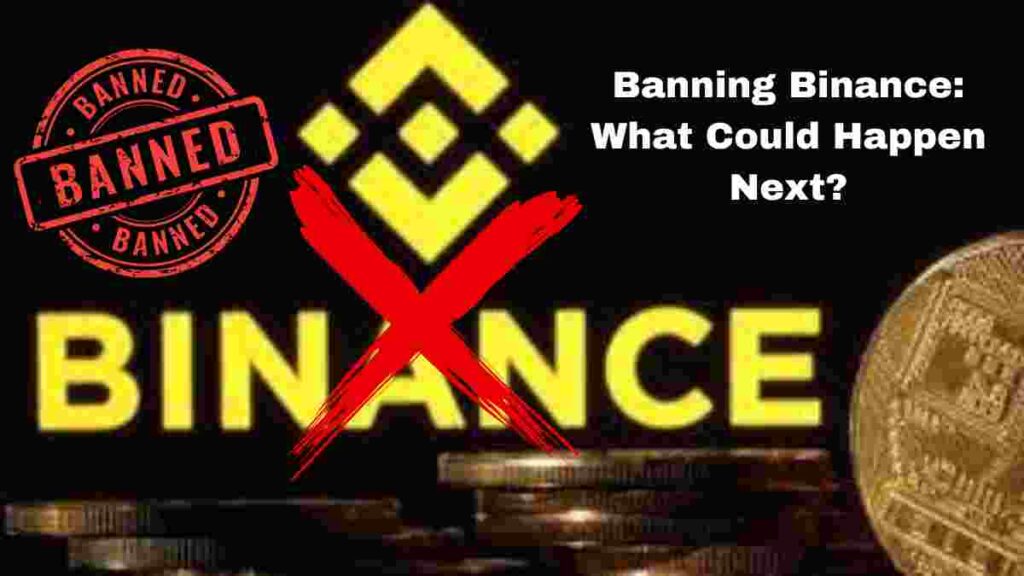{Banning Binance, India crypto regulations, crypto exchange ban, Binance blocked, offshore exchanges, crypto taxes, crypto advocacy, decentralized exchanges, fintech regulations, cryptocurrency future, Web3 potential }

Banning Binance And Clamping Crypto: Can India Afford the Fallout?
The Indian government recently took the major step of blocking access to several major offshore cryptocurrency exchanges like Binance, KuCoin and Huobi. This move came after the Bharat Web3 Association (BWA), India’s main crypto and Web3 advocacy group, sent a letter to regulators calling for action against foreign exchanges not complying with local laws.
This development will have significant impacts on India’s crypto industry. Let’s explore the key events, analyze the potential fallout, and understand what it means for the future.
Banning Binance: Background – How Did This Happen?
In March 2022, India mandated that all crypto entities register with the Financial Intelligence Unit (FIU) and comply with anti-money laundering laws. So far, 31 domestic businesses have registered.
However, major offshore exchanges like Binance, KuCoin, Huobi, Kraken and others failed to establish a legal presence in India. On December 16, BWA Chairman Dilip Chenoy sent a letter to Finance Ministry officials.
The letter asked the government to:
- Issue show cause notices questioning why action shouldn’t be taken against non-compliant offshore platforms
- Mandate they register a local entity
- Require back payment of the 1% TDS tax since July 2022
- Block access if they don’t comply
Shortly after, the government blocked access to 9 exchanges and gave them 2 weeks to explain why action shouldn’t proceed. The BWA had asked for a 1 month grace period.
Banning Binance: Impact on Local Exchanges
The BWA’s bold request signals local exchanges are struggling after India imposed high taxes in 2022 – a 30% tax on profits and 1% TDS on transactions.
A report found the 1% TDS caused 5 million users to move offshore, costing $420 million in lost revenue. Indians transferred $3.8 billion in volume away from local platforms.
Domestic exchanges can’t compete with tax-free foreign options. By urging clampdowns, they hope to regain market share. But these actions could also discourage crypto adoption if limits continue tightening.

Banning Binance: What Could Happen Next?
If exchanges don’t sufficiently justify their non-compliance, India may:
- Force them to create local subsidiaries
- Block access on app stores
- Ban IP addresses
- Demand back payment of TDS taxes
These outcomes would decimate volumes on major exchanges. Billions in trades could shift back to Indian platforms.
However, clamping down too forcefully may simply push more users to decentralized exchanges like Uniswap. Overly stringent control often backfires.
A Never-Ending Struggle?
India’s crypto tug-of-war epitomizes the challenges governments face in regulating borderless assets. When local laws grow restrictive, users access offshore options. But this triggers demands for equal enforcement.
The result is often an escalating battle of tighter limitations countered by greater decentralization. For example, China banned crypto entirely, but trading persists on DeFi and via VPNs.
India risks provoking the same cat-and-mouse game unless balanced regulation emerges. But with emotions running high, moderate compromises may prove elusive.

What Should India Do?
Rather than reactive bans, India could take proactive steps like:
- Lowering taxes to disincentivize offshore migration
- Sandboxing innovative projects with looser restrictions
- Collaborating with exchanges to co-develop policy
Such win-wins enable growth and oversight simultaneously. Yes, risks exist, but pragmatic collaboration outperforms adversarial tension.
Banning Binance: The Path Forward
With mammoth potential and intense opinions, India’s crypto industry won’t subside quietly. But if stakeholders jointly pursue workable frameworks, promising futures await.
India possesses the talent to become a Web3 hub. Or it could ban itself into irrelevance. The choice lies in India’s hands. But the prudent path forward seems clear.
Instead of attempting to over-control crypto, India should lead the charge in moulding its promise. If this happens, the world will watch and learn as India charts the course for the 21st-century digital economy.
Frequently Asked Questions on Banning Binance
Q: Why did the Bharat Web3 Association request action against offshore crypto exchanges?
A: High Indian taxes were causing users to migrate offshore, so they wanted enforcement to level the playing field.
Q: What specific actions did they request from the government?
A: Issuing show cause notices, mandating local subsidiaries, collecting back taxes, and potentially blocking access.
Q: How much trading volume and revenue has India likely lost from the 1% TDS tax?
A: Estimates suggest $3.8 billion in volume and $420 million in revenue.
Q: What outcomes could happen if exchanges don’t properly respond to the notices?
A: Forced local subsidiaries, banned app/IP access, and collection of back taxes on transactions.
Q: How might India’s tightening restrictions backfire?
A: By pushing more users to decentralized platforms beyond government control.
Q: What are some moderate approaches India could take instead of outright bans?
A: Lowering taxes, sandboxing projects, and collaborating with the industry.
Q: Why does crypto regulation often become a back-and-forth battle?
A: Limits trigger migration to alternatives, sparking demands for equal limits there.
Q: What is India’s prudent path forward for crypto regulation?
A: Pragmatic collaboration between government and the industry.
Q: What might happen if India takes the lead in progressive crypto regulation?
A: It could become a Web3 hub and model for 21st-century digital economies.
Conclusions For Banning Binance
India faces a choice between pragmatic collaboration with crypto or reactive clampdowns. The prudent path forward is proactive leadership in developing balanced regulation.
Disclaimer:
This blog CryptoWini provides general information only. It is not intended as legal, financial or investment advice and should not be construed or relied on as such. Before making any commitment of a legal or financial nature you should seek advice from a qualified and registered legal practitioner or financial or investment adviser.
Also Read :
India Crypto Regulation-Blocks Binance And 8 Other Crypto Exchanges: Know Why?
Binance Drops a Shocking BOMBSHELL: Say Goodbye to BUSD Forever in 2023
Breaking News: Binance Introduces MirrorX – The Future of VIP Trading in 2024






























